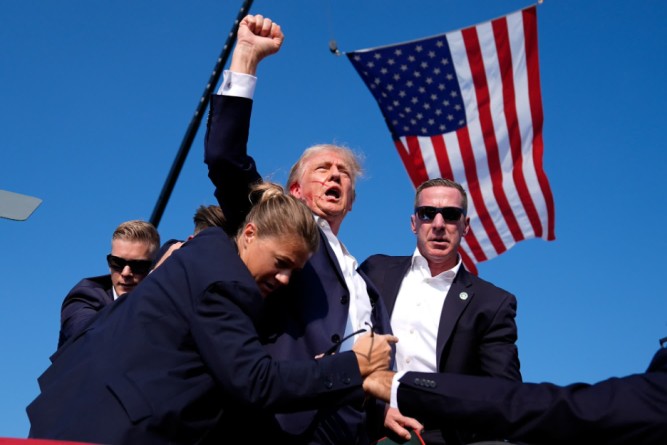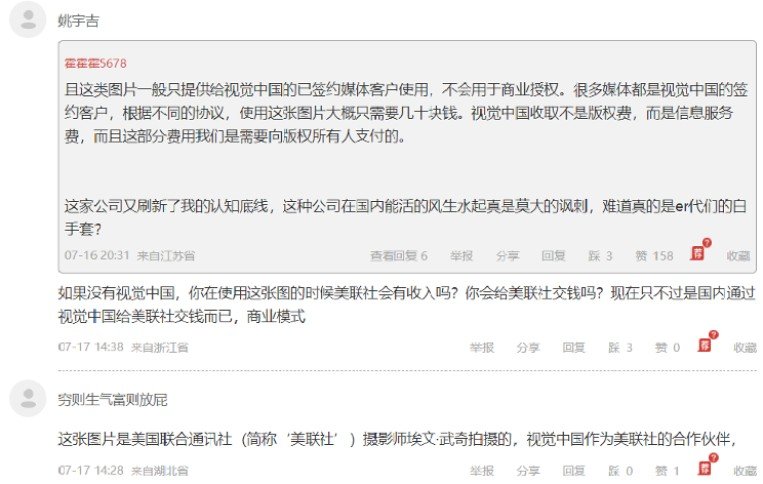Former U.S. President Donald Trump, with his fist raised and blood on his ear, surrounded by the Secret Service and the American flag in the background, was photographed by Evan Vucci, an American photographer for the Associated Press (AP) during the chaos of the attempted assassination at the July 13 campaign rally. The image quickly went viral, spreading across global news outlets and becoming a fixture in memes and stickers on social media. It was also commercially exploited on platforms like Taobao and JD.com in China, as well as Amazon and Etsy in the U.S. Within hours of the incident, products featuring the image of Trump were available worldwide.
Under the U.S. copyright law, the photographer generally holds the rights to their image unless those rights are explicitly transferred or if the photographer is an employee. When a work is classified as a “work made for hire,” the copyright belongs to the hiring party, not the creator. In Vucci’s case, as an employee of the Associated Press, the news agency likely retains the copyright for the photo, depending on the contract terms between Vucci and the news agency. Unauthorized commercial use of the photo constitutes a violation of these rights.
China’s copyright law also provides protection for Vucci’s photographs. According to Article 2, Paragraph 2 of the copyright law, works by foreigners and stateless persons are protected in the country under international agreements or treaties signed by their country of origin or habitual residence. The Berne Convention, which China and the U.S. have signed, stipulates automatic copyright protection among member states.
A controversy emerged on Chinese news websites after local media reported that the photo was credited to Visual China Group, a Chinese photo and media agency. Some netizens questioned the ethical and legal practices of Visual China, alleging that the company has a history of overstepping copyright and commercialization boundaries. Others argued that Visual China paid the Associated Press for distribution rights.
One netizen, who goes by the alias Yuji Yao, commented on Guancha in response to claims that Visual China is misappropriating AP’s credit: “If there were no Visual China, would AP have made money while you were using this photo? Are you going to pay AP? Now it’s just a domestic payment to AP through Visual China, a business model.” A rumour that Visual China charged Rmb2,100 (US$275) for the photo’s use fueled the online controversy.
A Visual China staff member clarified that the Rmb2,100 (US$289) fee applies if the photo is used as a social media illustration for self-media articles, allowing usage across multiple platforms with a single purchase. The staff explained that this fee is often misunderstood as a commercial use authorization fee. In reality, such images are typically available only to Visual China’s media clients, not for commercial use. Many media clients pay only a few dozen yuan per image based on their agreements. Visual China charges an information service fee, not a copyright fee, which is paid to the copyright holder.
Given the easy access to many images online, the source of such images can often be unclear, highlighting the need for clearer guidelines on their use. Based on the Notice on Regulating the Order of Copyright for Network Reproduction issued by China’s National Copyright Administration, Article 5 defines “current events news” as simple factual information reported through newspapers, journals, radio stations, television stations and other media. This type of factual information is not protected by copyright law. However, any news, communication, feature or report that includes the original work of the copyright holder is not considered simple factual information. When internet media reprints such content, permission must be obtained from the copyright holder and compensation must be paid.
While current events stand in the grey area of copyright protection and infringement, the relationship between Visual China and the Associated Press needs to be clarified.
- Cathy Li








